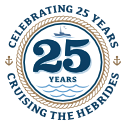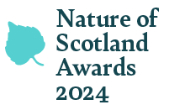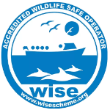Common dolphins are actually normally not all that common in the Hebrides, but this has changed recently. The number of common dolphins found in the waters off western Scotland has substantially increased; the encounter rate has more than doubled in the past 12 years according to the Hebridean Whale and Dolphin Trust
According to the Trust, common dolphins are rarer in the Hebrides due to the colder temperature of the waters. They generally prefer to live in southern parts of the coast, where waters reach 10 degrees Celsius or 50 degrees Fahrenheit. The rise in water temperature in the Hebrides by about 0.5 degrees Celsius per decade could be the reason the common dolphins are beginning to stay in these waters. Common dolphins go to the Hebrides because of the waters’ seasonal food stocks in the spring so this is when sightings are first likely, especially when the dolphins ride the waves of passing boats.
At Hebrides Cruises we feel this is good news, with our guests more likely to spot common dolphins in the wild than before and explains the increase of sightings from our own boats with 2014 a particularly good year. However, we are all aware and concerned of the complexity of why changes take place in the wild and are pleased that the Hebridean Whale and Dolphin Trust is undertaking further research to try and find the reasons for the increase in common dolphins.
The Trust is currently recruiting volunteer dolphin-spotters to work closely with marine experts to help the organization complete its annual survey this summer onboard the Silurian, a special yacht used during research trips. A vital database has been developed for these studies, allowing researchers to investigate changes in cetacean populations. The information collected also allows the trust to protect the species and habitats observed, including spots designated as Scottish Marine Protected Areas.
Anyone who is interested in volunteering will work with marine scientists for 12 days aboard the Silurian. They will help conduct visual surveys as well as use specialist equipment for acoustic monitoring. Volunteers will also help identify cetacean species through dorsal fin photography. The researchers will depart either from Tobermory on the Isle of Mull or Kyle of Lochalsh. They will cover areas such as the Mull of Kintyre, Cape Wrath, and St. Kilda during the survey.
Meanwhile, onboard Hebrides Cruises, our own Wildlife Guide Vivi Bolin who has close links with the Trust will be recording sightings of cetaceans, seals and basking sharks as well as sunfish, with guests being invited to join in. The data recorded during the cruises will be shared with the Hebridean Whale and Dolphin Trust to feed into their important scientific analysis.


























Could not fault the outstanding scenery, all anchorages were well thought out to give the most comfortable time for the passengers, the crews knowledge was in depth which gave peace of mind, Vivi’s enthusiasm and wit was infectious.
Gwyn Berry: 8 April 2016